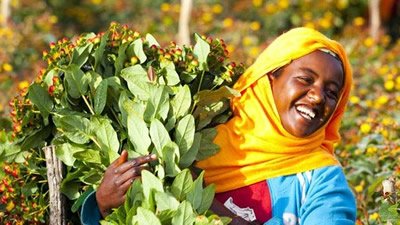Trade in agricultural commodities is the next frontier for UNCTAD's ASYCUDA program, which reduces bureaucracy, corruption, and trade delays in as many as 93 developing countries by automating customs procedures.
In 2013, with support from the Government of the Netherlands, the software was adapted to facilitate customs clearance for horticultural products too in a sub-program referred to as ASYCER.
The new sub-program builds on ASYCUDA - which stands for Automated System for Customs Data - by introducing certification for horticultural products.
The first country to pilot ASYCER - which stands for Automated System for Certification - was Ethiopia.
"Flowers are especially perishable, and cutting customs clearance times can bring significant benefits to farmers," said Fabrice Millet, Chief of the ASYCUDA program at UNCTAD's Division on technology and logistics.
"Instead of queuing at the airport, farmers can use the internet from their farms, which might be half a day's drive from the airport, to obtain the necessary phyto-sanitary certificates" Millet said. "This cuts clearance times from hours to minutes."

A few more countries have requested UNCTAD support to implement the program which covers other horticultural products such as coffee, grain, and tea. But Millet says the number of participating countries could grow quickly.
The world's rapidly growing demand for food represents a major opportunity for agricultural producers in the developing world. And efficient customs clearance will be vital to satisfy complex phyto-sanitary requirements, reducing delays and wastage too.
"The potential for ASYCER is the same as for our ASYCUDA program," Millet said. "We think a hundred countries could be interested."
By making customs controls more efficient for horticultural goods, ASYCER can also help protect against the risks of invasive species and the spread of pests and disease.
Millet says he would be glad to see ASYCER benefit developing countries the way that ASYCUDA has done. In Afghanistan, where customs collections are an important source of revenue, ASYCUDA has reduced inefficiencies, cut corruption, and boosted tax collection significantly.
Since 2002, these customs collections have grown dramatically from $50 million in 2002-03 to more than $1 billion in 2012, and contributing more than 35 percent of government revenues in 2014-15, according to World Bank figures.
"When we arrived in Afghanistan, customs clearance required 62 signatures," Millet said. "By automating procedures, this program was a big, big change".
ASYCUDA is UNCTAD's largest technical assistance program. By automating customs systems, the program allows the collection of data to help with both the implementation of international conventions and with the creation of statistics for government analysis and planning.


